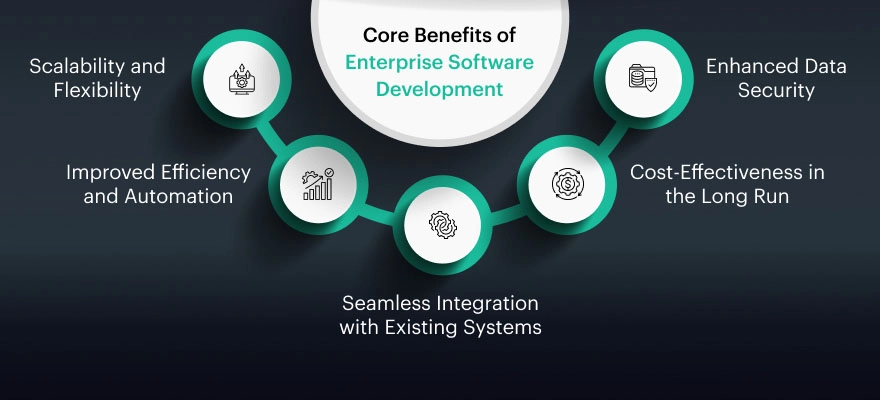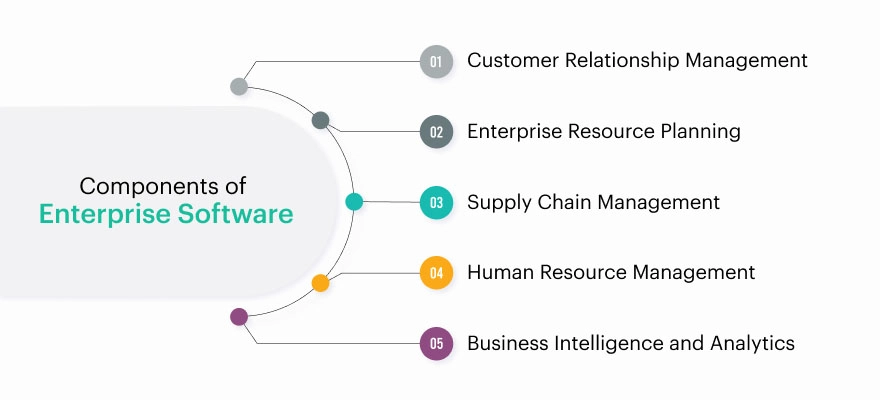What Makes Enterprise Software Development Essential?

Table of Contents
In today’s digital first world, companies are equally driven to innovation, scope and great pressure to give customers and employees. This is where Enterprise Software Development plays a transformative role.
Unlike traditional software, business software is designed to manage complex workflows, streamline operations and enable them to make smart decisions throughout. With trends such as Cloud Computing, AI-Operated Automation and Low Code Enterprise App Development Industries, strong business solutions have never been higher.
Companies are now heading for business software development to create applications that fit their specific requirements, whether it is Enterprise Resource Planning (ERP), Customer Management or Supply Chain adaptation.
Partnering with the right business software development company ensures access to skilled business software developers who can design scalable, secure and future systems. From corporate application software to innovative corporate application platforms, these solutions make companies strong in today’s changing markets to be competitive, agile and development oriented.
Unlock Web Development Potential for Your Business Today
From roadmap to execution, we’ll help you implement AI that drives measurable growth.
What is Enterprise Software Development?
Enterprise software development refers to the process of designing, building and maintaining applications that meet the complex requirements of large organisations. Unlike the tool off the shelf, the enterprise software is designed to organise the workflow, manage the workflow, and ensure that different departments, from finance to human resources, work together.
With a quick digital transformation, businesses move quickly towards adapted software development for companies to meet their unique operating challenges.
Today’s market requires business solutions that are beyond basic functionality. From Enterprise Resource Planning (ERP) and Customer Relationship Management (CRM) to Advanced Enterprise Application Software, organisations depend on these devices to improve their efficiency and decision-making.
Top company software development companies are now integrating AI, Cloud Computing and IoT in their offers, making modern business applications smarter and more scalable. Skilled business software developers play an important role in distributing enterprise app development and enterprise software development services that allow companies to remain competitive.
What are the Core Benefits of Enterprise Software Development?
In today’s digital economy, companies cannot rely on general equipment to manage operations. They require business software development to create strong, scalable and safe systems that match their developed needs.
Unlike the software outside the shelf, adapted business software development ensures that the solutions are specially designed for business goals, whether it is streamlining processes, enabling collaboration or managing data more efficiently.
The partnership with Enterprise Software Development Company allows organisations to develop business solutions and get a competitive advantage.

1. Scalability and Flexibility
Modern businesses develop hastily, and their software must grow with them. Through app development, businesses can easily score their structures, without resolution, new customers, markets or technology.
2. Improved Efficiency and Automation
Companies such as organisational resource plan (ERP), with software, automate repetitive responsibilities, reduce guide errors and increase decision-making. This results in smoother operations and better productivity.
3. Enhanced Data Security
Security is a top priority. Enterprise software developers design applications with advanced compliance and encryption measures, ensuring sensitive data remains protected.
4. Cost-Effectiveness in the Long Run
Though the initial investment in employer software program improvement offerings can be high, tailor-made systems reduce long-term operational costs by eliminating inefficiencies.
5. Seamless Integration with Existing Systems
A properly constructed corporation application integrates smoothly with existing equipment, making sure departments from HR to finance play in sync without information silos.

What are the Components of Enterprise Software?
Successful business software development is not just about making applications; It is about creating a connected ecosystem that addresses each important business function. Modern organisations rely on different types of business applications to streamline workflows, improve cooperation and make data-driven decisions.
This is why most of the most important companies’ software development companies design solutions around specific business requirements, ensuring scalability and integration. Let’s look at the main components that form the basis for effective business solutions.
1. Customer Relationship Management
A CRM system helps companies adapt customer interactions, track sales pipelines and services. Through adapted business software development, CRM can be tailored to meet the requirements of a unique industry and strengthen customer loyalty.
2. Enterprise Resource Planning
ERP is one of the most important kinds of Enterprise Application Software. It centralises functions like finance, supply chain, and operations right into a unmarried platform. With the proper organisation software builders, corporations gain higher visibility, reduced fees, and increased efficiency.
3. Supply Chain Management
SCM applications optimise inventory, logistics, and vendor management. These enterprise software development services ensure seamless product movement and minimise bottlenecks.
4. Human Resource Management
HRM systems streamline recruitment, payroll, overall performance tracking, and employee engagement. With superior organisation app improvement, HR teams could make smarter decisions.
5. Business Intelligence and Analytics
Modern corporate software programs contain BI tools to convert uncooked information into actionable insights. This empowers leaders to make real-time selections, making sure groups live aggressively.
By integrating these essential additives, groups can create effective employer software program answers that not only meet current needs but also put them together for future growth.
Smarter Decisions. Faster Outcomes.
Leverage expert web development consulting to cut costs, boost efficiency, and stay ahead of competitors.
Why Enterprise Software Development Is Essential?
Any unexpected changes in monetary environment, a company’s software development is not an alternative; it is a necessity. Companies attempt to maintain pace with technological advancements, customer expectations, and global competition.
Organisations can use adapted business software development to construct an equitable business application that addresses their specific operational concerns while also promoting growth and innovation.
1. Supporting Digital Transformation
Modern establishments are undergoing a large digital transformation, adopting cloud computing, AI, and automation to remain aggressive. Robust agency software program improvement services help agencies integrate these technologies seamlessly into existing organisational solutions, ensuring operational performance and innovation.
2. Meeting Evolving Business Needs
Businesses constantly face new challenges, from scaling operations to coming into new markets. Partnering with a dependable corporation software development business allows organisations to implement flexible, scalable company utility software which can adapt to changing requirements. Skilled organisation software program developers ensure the machine is designed for long-term success.
3. Enabling Real-Time Decision Making
With proper business app development, organisations can use real-time analysis and insight and strengthen their leaders to make data-driven decisions. Solutions such as Enterprise Resource Planning (ERP) and Business Intelligence Modules use information in the Actional Intelligence Information Departments.
4. Ensuring Competitive Advantage
Adapted business software provides companies a strategic advantage of improving efficiency, improving the customer experience and enabling rapid innovation. By investing in Advanced Enterprise Software Development Services, companies may be ahead of participants while maintaining agility in a dynamic market.
In short, equipped organisations for business software development with equipment that requires them to run smart, fast innovation and increase continuously.
What are the Challenges in Enterprise Software Development?
Although the development of enterprise software programs is important for modern agencies, it comes with demanding situations. From higher advanced costs to complex integration requirements, organisations should carefully plan and perform their digital initiatives.
A reliable business software development company can help navigate these obstacles by providing the right expertise, equipment and business software development services to companies. Below are some of the biggest challenges companies often face.
1. High Initial Investment
Developing custom enterprise software development projects requires significant investment. Unlike the tools off the shelf, the tailored Enterprise application includes extensive planning, advanced business app development and continuous updates. Although starting costs can be high, these solutions often appear to be more cost-effective in the long term due to efficiency gains and automation.
2. Complex Implementation
It can be challenging to integrate a commercial software package with existing systems such as ERP, CRM, or HR. Effective business software developers should ensure even integration by reducing shutdowns. This complexity increases when organisations use chronic systems or large operations are spread across many places.
3. Change Management and User Adoption
One of the most underestimated challenges is resistance to change. Employees may find it difficult to adapt to the new workflow for business software or workflows again. Effective training from the business software development company is important for using clear communication, continuous support and maximising the return from Enterprise Solutions.
Your AI Transformation Starts Here
Get a custom plan built around your business goals—without the tech overwhelm.
What are the Best Practices for a Successful Enterprise Software Development?
Production of successful business software development projects requires more than technical expertise; It requires a strong focus on strategy, plan and user needs. Together with transformed digital transformation industries, companies must use best practices to prove their business solutions scalable, safe and for the future. Whether it is a customised business software development or large-scale business app development, these practices help to reduce the risk and maximise ROI.
1. Understanding Business Goals
Each successful project begins with a clear understanding of business goals. A reliable business software development company works closely with stakeholders to identify pain points, define workflows and adjust the company’s application with long-term organisational goals.
2. Choosing the Right Technology Stack
It is important to choose the right tools, frames and platforms. Modern business software developers use cloud technologies, AI and automation to distribute advanced business applications. Continuous testing, general performance monitoring, and regular updates guarantee that business software is secure, efficient, and adaptable.
3. Prioritising User Experience (UX)
Adoption will suffer if employees find the technology difficult to use, regardless of how effective it is. Improves intuitive design, mobile-friendly business software and role-based dashboards and dedication.
4. Continuous Testing and Maintenance
Software is not a review investment; It develops with business needs. Continuous checking out, overall performance tracking and normal updates ensure that the enterprise software stays secure, green and adaptable. Reliable Enterprise Software Development Services include scaling, bug fixing and support for handling features.
By following this best practice, organisations can ensure their business software development journey, not only functionality, but also long-term commercial values.
What are the Future Trends in Enterprise Software Development?
Enterprise software landscapes are developing rapidly, with innovation, business requirements and pushing against digital-first ecosystems. Here are some of the most effective trends:
1. Cloud-Based Solutions

Cloud Adoption has become a priority for almost all business software development companies. Cloud-based business apps replace the on-premises system, with benefits such as scalability, cost efficiency and access. From ERP to EAS, corporations are depending on clouds to ensure agility, better cooperation and information safety.
2. Artificial Intelligence and Automation

AI and automation are no longer future concepts; They are mainstream. In customised business software development, AI allows for future sayings, a Chatbot for Customer Aid and Smart Process automation. It reduces human mistakes, accelerates workflows and strengthens companies with data-driven insights. Enterprise software developers are quickly building to distribute smart applications in machine learning algorithms and natural language processing in business solutions.
3. IoT Integration

IoT changes the activation of the Entrepreneurship Activation by activating real-time data collection and monitoring. From connected factories to smart logistics, IoT-operated business applications allow companies to make better operating decisions. When combined with AI, IoT provides powerful commercial enterprise solutions that grow productivity and enhance customer reviews.
4. Low-Code and No-Code Platforms

This is why low-code structures and no-code are gaining popularity in enterprise software development offerings. These platforms allow non-technical teams to quickly produce and customise applications, reducing the dependence on coding-thorough growth cycles. For companies, this means rapid innovation, quick response to the market demands and better efficiency.
Conclusion
Investing in enterprise software development is not elective; it’s far critical for organisations aiming to thrive in today’s digital-first landscape. From ERP to adapted improvement of the employer program, they streamline solution operations, automate strategy and provide real-time insights that help organisations to scale effectively.
By working with a reliable business organisation for companies, the group can use advanced technologies such as Cloud Computing, AI and IoT, which ensures long-term adaptability and flexibility to create tailor-made employer packages. The result is stepped forward efficiency, reduced charges, and a more potent basis for innovation.
Ultimately, organisation app development is set more than simply technology; it’s about riding the boom and virtual success. Modern corporate utility software program empowers companies to make data-driven decisions, beautify patron reports, and hold a competitive edge in rapidly evolving markets.
With professional organisation software program developers constructing scalable and secure solutions, companies can liberate the entire potential of digital transformation. In short, making an investment in business agency software improvement services is a strategic move that allows groups to future-proof their operations and attain sustainable fulfilment.
FAQs
Enterprises need custom software development to address unique business needs, improve efficiency, and gain a competitive edge with solutions tailored specifically to their processes and goals.
Examples include Enterprise Resource Planning (ERP), Customer Relationship Management (CRM), Supply Chain Management (SCM), Human Resource Management (HRM), and Business Intelligence (BI) tools.
It offers scalability, automation, enhanced data security, seamless integration with existing systems, and long-term cost savings while supporting digital transformation.
The timeline varies based on complexity, features, and customisation, but generally, enterprise software development takes between 4 to 12 months for a full-scale application.

Samuel Meleder
Samuel Meleder founded Chimpare, a global company that builds software solutions. With a passion for innovation and a commitment to helping businesses grow through smart digital strategies, Samuel leads a global team delivering cutting-edge solutions across industries
Found this post insightful? Don’t forget to share it with your network!
Related Articles
Top 10 Mobile App Development Companies in 2026 Worldwide?
Mobile apps have silently subsumed almost every element of our everyday existence. Handling everything from food orders and cab booking to business

Why Choose Cross‑Platform App Development for Your App?
Consider a wonderful app idea you have. You have envisioned every other element that will have clients love it: the

How Can You Create an Android App Step by Step Successfully?
Have you ever given the process of creating the apps you use daily any thought? Like Instagram’s sophisticated camera tools,
